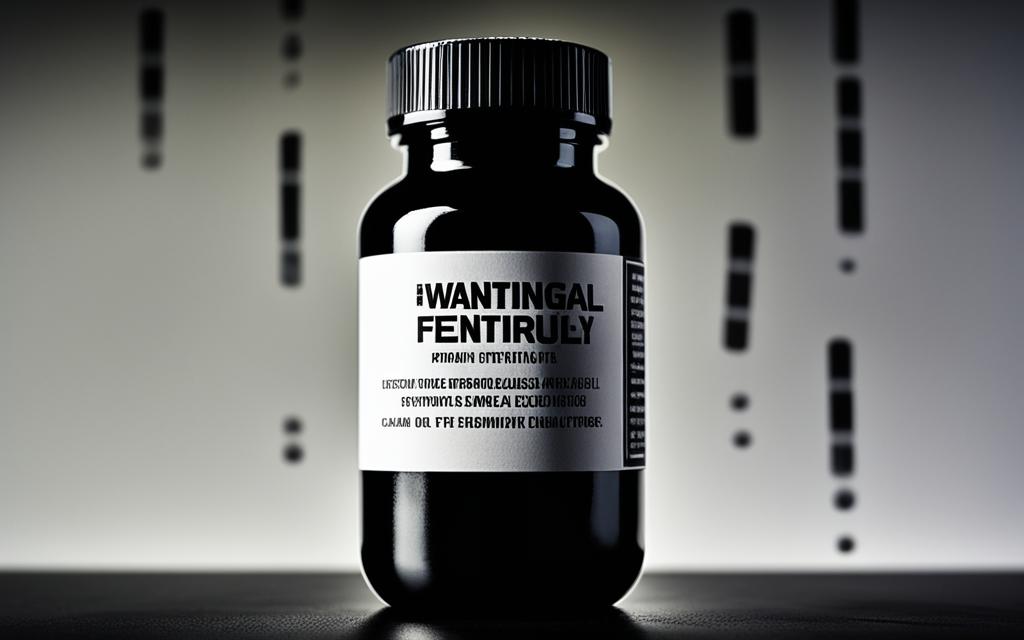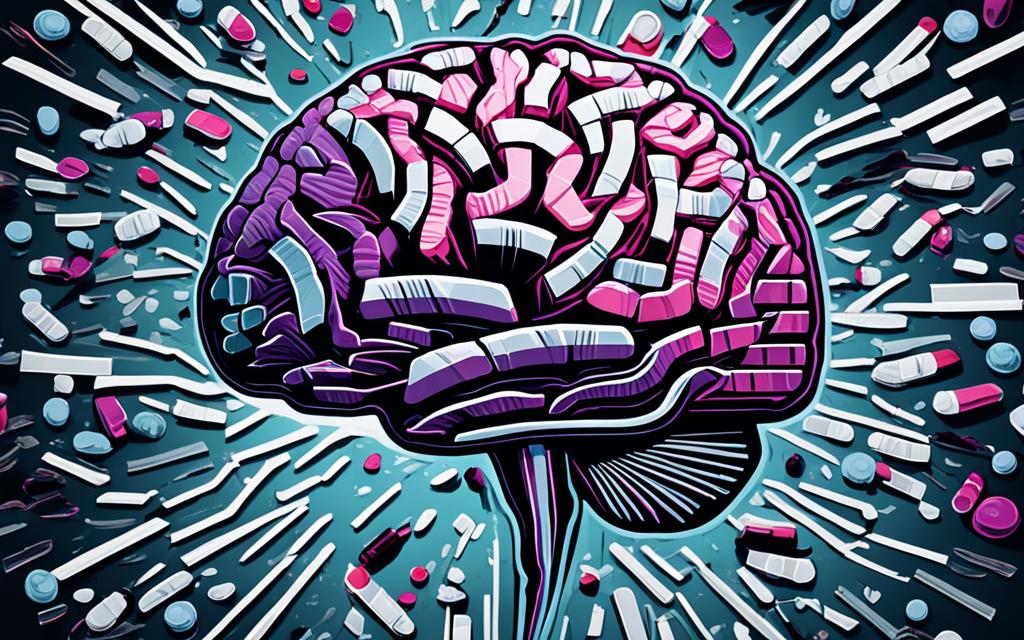The Impact of Fentanyl on Your Mental Health
Fentanyl is a strong synthetic opioid that’s causing major problems for mental health across the U.S. It’s 50 to 100 times more powerful than morphine. This has led to many more cases of substance abuse disorder and risks of overdose. It’s vital to know how fentanyl affects your mental health to fight back against this crisis.
Key Takeaways
- Fentanyl is a highly addictive synthetic opioid that can lead to substance abuse disorder and mental health issues.
- Fentanyl addiction can alter brain chemistry and function, contributing to depression, anxiety, and cognitive impairment.
- Overdose risks associated with fentanyl are alarmingly high, highlighting the urgency for awareness and prevention strategies.
- Addressing the mental health crisis fueled by fentanyl requires a comprehensive approach, including education, treatment, and community support.
- Recognizing the signs of fentanyl use disorder and seeking timely intervention can save lives and promote mental well-being.
The connection between fentanyl and mental health is very serious and we need to act on it. Bringing up the topic, teaching about it, and making sure treatments are available are key. This can help lessen the awful effects fentanyl has on people, their loved ones, and communities.
Understanding Fentanyl’s Potency and Risks
Fentanyl is a very powerful synthetic opioid. It’s been getting a lot of attention because more people are using it illegally. This drug is 50 to 100 times stronger than morphine. That’s why it’s a big worry for preventing overdoses and helping those who are addicted.
What Is Fentanyl?
Fentanyl was first made to treat severe pain, like after surgeries. But it’s now often made and sold illegally. It comes in fake pills or is mixed into other drugs. Because it’s so strong, people use it to get a quick high.
The Deadly Consequences of Fentanyl Overdose
Fentanyl is super dangerous because it can quickly slow down breathing. This can be deadly. Even a tiny bit of fentanyl can be life-threatening. This is why it’s so important to know the dangers, especially of using drugs that might have fentanyl in them.
Knowing the signs of a fentanyl overdose, like breathing slowly, feeling dizzy, or passing out, could help save someone’s life. If you suspect someone has overdosed on fentanyl, quick action is crucial. They need emergency help right away. Giving them naloxone, a medication that can reverse opioid effects, can also be life-saving.
The Link Between Fentanyl and Mental Health
The relationship between fentanyl and mental health is serious. Fentanyl, a strong man-made opioid, is at the center of an opioid addiction crisis. It’s caused a lot of harm. This powerful drug can lead to overdose and badly affect mental health. It’s a tough challenge to face.
Fentanyl Addiction and Its Effects on the Brain
Addiction to fentanyl can change how the brain works. It affects the part of our brain that feels rewarded. This leads to changes that cause depression, anxiety, and issues with thinking. The feelings of stress and trouble addiction brings makes this mental health crisis worse.
Co-occurring Mental Health Disorders and Substance Abuse
Many struggle with both fentanyl addiction and mental health problems. Some use fentanyl to cope with deeper issues like depression or anxiety. But, fentanyl can also make mental health problems worse. This cycle is hard to stop.
The Impact of Fentanyl on Your Mental Health
Fentanyl can affect mental health in many ways. It messes with your brain chemistry. Addiction makes you feel up and down, and can lead to depression and anxiety. It can mess up your thinking, memory, and decisions too.
Using fentanyl can also ruin your life in other ways. It can break relationships and cause money problems. The shame from addiction can make you feel isolated, with low self-esteem. All of this can block you from seeking help, even from family support resources.
Addressing the mental health aspects of fentanyl addiction is crucial for your recovery. A full approach that includes addiction help, mental health care, and support is key. It helps you deal with all the challenges.
Recognizing the Signs of Fentanyl Use Disorder
Fentanyl is a potent synthetic opioid, playing a big role in today’s substance abuse crisis. Knowing the signs of fentanyl use disorder is key. This helps individuals and their loved ones get early intervention and treatment. We’ll look at the symptoms and changes that show someone might have an addiction. This knowledge can help spot overdose risks and take the right steps.
Physical Symptoms of Fentanyl Addiction
Fentanyl addiction shows through different physical signs, like:
- Respiratory depression: Fentanyl makes your body breathe slowly and not as deeply.
- Drowsiness and sedation: You might feel very tired, struggle to stay awake, and move slowly.
- Constipation: Fentanyl slows down your stomach and intestines, leading to constipation.
- Nausea and vomiting: These feelings might happen more at the start of using fentanyl.
- Constricted pupils: The eyes might have smaller pupils, which often happens with opioid use.
Behavioral Changes Associated with Fentanyl Use
People using fentanyl might also show changes in their behavior, like:
- Mood swings and irritability: Their mood can change fast, and they might be more easily annoyed or upset.
- Social withdrawal and isolation: They could start avoiding friends, family, and activities they used to enjoy.
- Lack of motivation and lethargy: Not feeling energetic or interested in things is common with fentanyl’s effects.
- Risky behaviors: They might do dangerous or illegal things to get more fentanyl or money for it.
- Financial difficulties: Addiction to fentanyl can lead to money problems, possibly making them borrow or steal.
Knowing both the physical and behavioral signs can make spotting a fentanyl use disorder easier. This allows for early action and treatment access. These steps are critical in fighting fentanyl addiction’s harmful effects and lowering overdose risks.
The Mental Health Crisis Fueled by Fentanyl
Fentanyl use and opioid addiction have led to a widespread mental health crisis. This crisis doesn’t just affect those using it. It also harms their loved ones. This powerful synthetic opioid brings serious physical dangers. It also greatly affects mental health, creating challenges for those addicted and their families.
Anxiety, Depression, and Fentanyl Use
Fentanyl use can make anxiety and depression worse. It may offer a short escape at first but leads to dependency. This, in turn, worsens mental health symptoms over time.
The drug changes brain functions. This can cause anxiety, paranoia, and mood swings. The search for the next high and fear of withdrawal causes a cycle. This cycle can trap a person in anxiety and depression, making it hard to stop using.
The Toll of Fentanyl on Families and Communities
Fentanyl addiction impacts not only the user but whole families and communities. Loved ones face emotional and financial stress. They also deal with strained relationships from supporting someone with addiction.
“When a family member is struggling with fentanyl addiction, it’s like a dark cloud hangs over the entire household. The constant worry, the emotional rollercoaster, and financial burden can take a severe toll on everyone’s mental health.” – Dr. Sarah Williams, Clinical Psychologist
Overdoses and the fear of fentanyl create stress in communities. This worsens the overall mental health crisis.
To tackle the mental health crisis prompted by fentanyl, we need a mix of solutions. This includes easy-to-access treatment, support, and community resources. These steps help individuals, families, and communities fight the effects of fentanyl and heal.
Getting professional help and using family support resources are key. So is talking openly about mental health and addiction. This is how to reduce the psychological damage caused by fentanyl. And it helps everyone’s wellness.
Fentanyl-Laced Drugs: A Hidden Danger
The drug scene has become very dangerous with the rise of fentanyl mixed drugs. This powerful synthetic opioid is slipped into illegal drugs. Often, users don’t know, leading to a high risk of overdose and death.
The Prevalence of Fentanyl-Laced Substances
Fentanyl is now found in a range of illegal drugs, like heroin, cocaine, and fake pills. It has become a big problem, with more fentanyl-drugs showing up across the U.S. This spike is fueling the ongoing substance abuse crisis.
Strategies for Identifying and Avoiding Contaminated Drugs
It’s vital to have a plan to spot and stay away from fentanyl-drugs. Experts suggest using testing kits before taking any substances. Also, getting help from reliable sources offering addiction treatment can support recovery.
Overdose prevention is key for those facing substance issues. Access to naloxone and knowing how to recognize an overdose are crucial. These measures can help save lives and cut the danger of fentanyl-laced drugs.

By sharing info about fentanyl-laced drugs and harm reduction, people can act to keep safe. It’s about making smart choices to safeguard yourself and your family from these dangerous substances.
Overdose Prevention and Response
Fentanyl is both strong and very common in illegal drugs. This has led to a big increase in overdose risks. To fight this crisis, we need to focus on both stopping overdoses before they happen and helping quickly when they do.
Naloxone and Its Lifesaving Role
Naloxone, often called Narcan, is key in stopping opioid overdoses. It can start normal breathing again fast. It turns around the deadly effects of drugs like fentanyl. Naloxone should be easier to get and more people need to know how to use it. This is crucial for saving lives.
Harm Reduction Strategies for Fentanyl Users
Although the best way is to not use fentanyl, not everyone can stop right away. Harm reduction helps lower the dangers for those who keep using. For these users, here are some key strategies:
- Safe injection practices and equipment distribution
- Drug testing kits to identify the presence of fentanyl in substances
- Overdose education and prevention programs
- Access to Fentanyl test strips
These methods help people stay safer and less likely to overdose by giving them knowledge and tools.
Working with family support resources and community groups is vital. They help set up wide ways to prevent and act on overdoses. Saving lives and helping those with fentanyl issues get better is a group effort.
Treatment Options for Fentanyl Addiction
Beating fentanyl addiction is tough but doable with the right treatment. It’s vital to have an approach that covers the physical and mental sides of the problem. This ensures a better chance of getting well.
Medication-Assisted Treatment (MAT)
MAT uses meds approved by the FDA, along with therapy, for treating addiction. Drugs such as buprenorphine, methadone, and naltrexone are used. They help curb cravings and ease withdrawal. This lets people concentrate on getting better.
Behavioral Therapies and Counseling
Therapies and counseling are key in dealing with the mental part of addiction. For instance, CBT guides people to change negative thoughts and actions linked to drug use. There’s also a therapy called contingency management. It rewards good actions. Plus, support groups offer a chance to connect with others facing similar struggles.
Crafting a plan that suits each person is crucial for battling fentanyl addiction. By using medication, therapy, and counseling together, people can take back their lives. Hope and lasting healing become possible.
Building a Support System for Recovery
Getting over fentanyl addiction and staying in recovery take more than just you working alone. It’s vital to have a strong support system. This network helps by keeping you accountable, offering emotional support, and creating a positive space. This is critical for facing the struggles of recovery and dealing with the mental health issues that can come with fentanyl use.
The Importance of Family and Community Support
The support from family and the community is crucial for recovery. They provide constant cheerleading, encouragement, and a place where you can freely talk about your challenges. Plus, they keep you on track, making it less likely to go back to using and helping you feel responsible for your recovery.
Being part of a supportive community can make you feel like you belong and help you feel understood, especially if you’re managing mental health issues along with addiction. Within these networks, you’ll find support groups, counseling, and education. These all will help you and your family learn how to deal with the complexities of recovery.
Resources for Individuals and Loved Ones
Many places and groups are ready to help build a strong support system for your recovery. Community centers, faith groups, and non-profits have services like counseling and support groups run by people who have been through similar situations. They offer advice and a shared journey towards getting better.
Furthermore, there are online sites and help hotlines that give info and support for fentanyl addiction. They’re especially useful for people in remote areas or who want to keep their identity private.
By using these resources and creating a network full of support and understanding, you can better your chances of success in recovery. It also helps in dealing with the mental health issues linked to fentanyl use.
Addressing the Root Causes of Addiction
To fight the fentanyl crisis’ harsh effects on mental health, we need to deal with its core. By addressing the reasons for drug addiction, we aim to find real solutions. These steps help people recover over time.
Mental Health Services and Fentanyl Addiction
Access to good mental health services is vital in battling fentanyl addiction. Mental issues like depression and anxiety often go along with drug use. It’s important to treat both addiction and these mental health issues at the same time.
It’s key to make mental health care affordable and high-quality. This can prevent people from using drugs like fentanyl to cope. Services like counseling, therapy, and support groups should be easy to get and meet everyone’s needs.
Advocacy and Policy Changes for Effective Solutions
Dealing with the fentanyl and mental health crisis needs changes in policy and strong voices. We must push for more money for treatment, harm reduction, and mental health programs.
Changing policies must also address the causes behind addiction, like poverty and unstable housing. This can create a fairer setting for all. It would help people stay well and avoid addiction more easily.
Pushing for laws that see drug abuse as a health issue, not a crime, is also crucial. This helps lessen the shame around getting help.
By bringing together leaders, health experts, and community voices, we can make a real impact. Working together, we can fight the root causes of addiction and the fentanyl crisis.
Conclusion
Fentanyl has a big impact on mentaftraul health. This synthetic opioid leads to a serious mental health crisis. It worsens the issues of opioid addiction and substance abuse disorder. It’s very important to talk about the deadly overdose risks with fentanyl, especially from fentanyl-laced drugs.
To fight the fentanyl crisis, we need many solutions. Making sure people have access to overdose prevention strategies helps. This includes more naloxone and promoting safer practices. Also, we should offer more addiction treatment options. This means using medicines and therapies that work and help people recover.
Treating other mental issues along with addiction is key. Offering big help with mental health can stop addiction from starting again. We must also make family support resources strong. A caring community helps individuals heal and continue their recovery journey.
FAQ – The Impact of Fentanyl on Your Mental Health
What is fentanyl, and why is it so dangerous?
Fentanyl is a powerful synthetic opioid. It’s much stronger than morphine. This makes it very risky. Only a tiny bit can cause an overdose. This can be fatal.
How does fentanyl affect mental health?
Fentanyl changes how your brain works. This can cause problems like depression and anxiety. It can also hurt your ability to think. And it can make your feelings very up and down.
Using fentanyl might make existing mental health issues worse. It also increases your chances of having more than one mental health problem.
What are the signs of fentanyl use disorder?
There are signs you might notice. These include not breathing well, being very sleepy, not going to the bathroom often, and small pupils.
You might also see changes in how someone acts. They might switch moods a lot or pull back from friends. They might lose interest in things they used to enjoy. Their sleep habits might change too.
How can I prevent an accidental overdose from fentanyl-laced drugs?
Want to stay safe from drugs with fentanyl? Here are some tips. Use kits that test for drugs. This lets you know what’s in them. When using drugs, be as safe as you can. This includes how you inject them.
Also, carry naloxone. This is a life-saving medicine that can stop an overdose. Always keep in mind that fentanyl is out there. Be careful.
What treatment options are available for fentanyl addiction?
If you’re addicted to fentanyl, there are ways to get help. One is called MAT. It uses certain medicines, along with talking to a counselor. This can help a lot.
Talking therapy can also make a big difference. Therapies like CBT and handling rewards can help with the emotional side of addiction.
Why is family and community support important for recovery?
Having your family and community behind you can be key to getting better. They offer big emotional support. They also help keep you focused and stay on track.
It’s also good to have support groups and other help around. They can teach you and give you resources. These are important for getting well and staying well.
How can advocacy and policy changes help address the fentanyl crisis?
Pushing for better laws and helping make changes can do a lot. It can improve how we treat people. It can also make harm reduction and mental health support more available. This also helps deal with other mental health problems.






